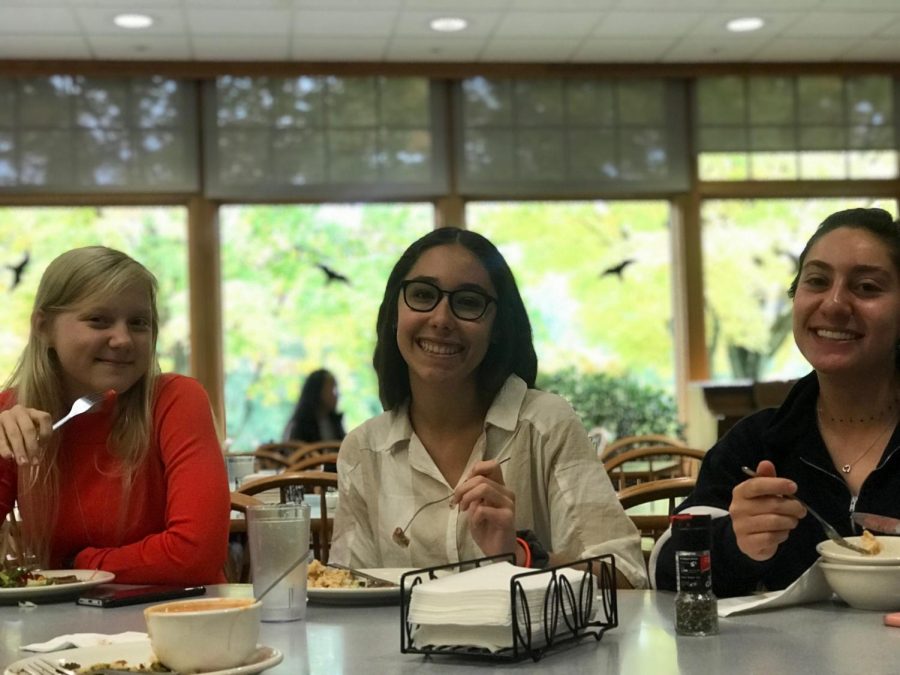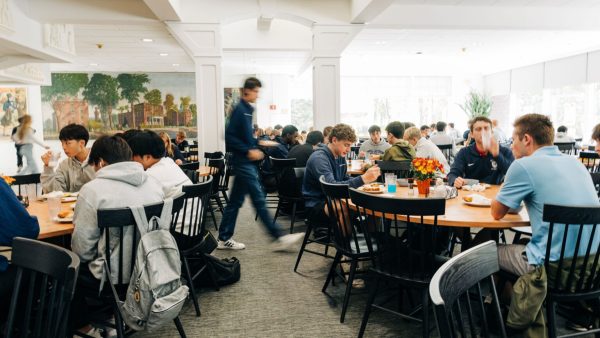New Cell Phone Policy Aims to Increase Student Engagement in Dining Hall
Do you spend too much time on your phone? Are you having conversations with the people sitting across from you? Do you take time to look at the world around you? This year, Williston has taken new steps to keep kids, and teachers, off their phones.
The new rule in the student handbook, on page 23, states, “Use of cellphones or other electronic devices for verbal conversation is not permitted at any time in any of the academic buildings or in the Birch Dining Commons, the Phillips Stevens Chapel, or the Clapp Library.”
Kathy Noble, Dean of Students, and David Koritkoski, Associate Dean, clarified the steps of the process that led to this ban and the expectations for a cellphone-free meal environment.
“Over the last few years, I’ve heard concerns from parents, students and faculty, and we enforced this rule to make a better community by being more engaged with each other,” said Noble.
According to Noble, being on your phone during meal times is not only poor etiquette, but also tremendously disrespectful to the people at your table.
“Most families, if they have a meal together, they engage in conversation,” Noble said, “and since we are a family here, or substitute family for boarders, we should do something similar.”
Williston trains each individual to have decent manners, and human interaction is essential in the real world. In order to completely eliminate the down-headed norm in the dining hall and during assemblies, and in the interest of of creating an engaged community, students are bound to face consequences if seen on a phone.
“If a phone is seen in the dining hall, it’s a decorum unit and in the second offense, the phone will be confiscated,” said Noble.
While there is a new scene when you walk into the dining hall, the policy has elicited mixed reactions from students. Lily Harris ’20, a boarder from Coral Gables, Florida, expressed her troubles adjusting to this policy when she is eating in the dining hall. “It is challenging, because I’d get a text from someone and I feel tempted to respond, but I remember the rule and resist the urge to look at my phone,” Lily said.
Junior Anaya Akpalu, from New York, agreed. “It’s hard to ask teens who grew up constantly around technology to turn it off for such long portions of the day,” she said. She also expounded on the heavy reliance teens have on their phones to get through the day without missing out on any crucial notifications.
Despite initial growing pains, it appears the practice to pocket your device has had a powerful impact on the community.
Bailey Schiff, a senior from Los Gatos, California, admires the new policy. She said it allows her to stretch her horizons. Bailey is able to connect with people and learn something new about someone everyday.
“I’m someone who loves to have conversations with people, so now I’m able to have even more conversations with the people around me,” she said.
Williston consists of a diverse student body with students from various states, countries, and socioeconomic backgrounds. Bao Pham, a senior from Vietnam and an International Mentor, emphasized the benefits of this policy for the community as a whole to exchange cultural stories.
“It is good, especially for international students, because they can get to know more about American culture and also share about their own country’s values,” Bao said.
The scene in the dining hall has certainly changed from everyone scrolling and tapping their phones to an environment where people are talking. Noble observed the positive shift in atmosphere.
“Overall students and faculty are more engaged in conversations in the dining hall,” she said. “The more we are putting down our devices and talking to each other, the better off we all will be as a community.”










